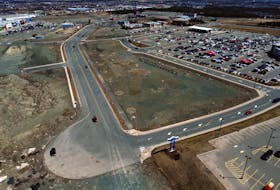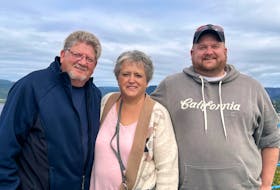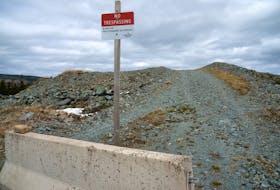ST. JOHN'S, N.L. — A massive crowd of people, young and old, took to the streets on Friday, demanding action on the climate crisis.
Crowd estimates range between 3,000 and 4,000 people attended the rally, with union activists and politicians taking to the microphone to speak about how the effects of the climate crisis can be mitigated.
The Intergovernmental Panel on Climate Change (IPCC), a United Nations body dedicated to studying the science of the climate crisis, says the effects of an overall increase in global temperature by 2 C would have catastrophic effects on the entire world, but particularly on islands and coastal areas.
“Increasing warming amplifies the exposure of small islands, low-lying coastal areas and deltas to the risks associated with sea level rise for many human and ecological systems, including increased saltwater intrusion, flooding and damage to infrastructure,” according to the IPCC.
“The slower rate of sea level rise at global warming of 1.5° C reduces these risks, enabling greater opportunities for adaptation, including managing and restoring natural coastal ecosystems and infrastructure reinforcement.”
Brett Favaro, an environmental scientist with the Marine Institute, says now is the time for politicians to listen to the science of the climate crisis, and listen to the children who march to protect their future.
“I think they don’t listen at their peril. The world is changing. We are not exempt from that, whether it’s our responsibility to fight climate change ourselves, but also just the fact that the economics are shifting,” said Favaro.
“Renewables are getting better, electric cars are getting better, all these things are going to displace the economic models that we’ve relied on in the past. We either get ahead of it and we lead and we all become prosperous, or we fall behind and we all suffer.”
Favaro says more aggressive commitments on reducing greenhouse gas emissions are needed on a global scale.
“Create a decarbonization plan that’s in line with the IPCC targets, that means 50 per cent down on emissions by 2030, 100 per cent by 2050, mandated by law,” says Favaro.
Premier Dwight Ball says the province unveiled its climate change action plan in March, which will see some action on addressing the climate crisis.
“In our action plan, there are 40 recommendations. It’s not just our action plan on climate change, we’re also putting an emphasis on digital-by-design, using less paper. Also, the addition of charging station in our province. We do not use enough electricity and electric cars in our province. We need to put the infrastructure in place. We committed to do this across our province,” said Ball.
“The other thing is around electrification of public buildings, as part of the rate mitigation plan, banning plastic bags, making sure the design of infrastructure is designed differently, we can use less electricity and so on.”
Meanwhile, the province is still committed to doubling oil and gas production in the province’s offshore oil and gas industry by 2030. Ball says there are no plans to change the Advance 2030 plans.
“The way I square that circle is, if I have to make a decision on where do I purchase oil, Newfoundland and Labrador, we’re very fortunate. Our jurisdiction, when you look at the reserves that we have off our shore, it’s 50 per cent less carbon intense than other jurisdictions. The fact is that the world today is using well over 90 million barrels of oil today,” said Ball.
“We’re using quite a bit of oil and it’s going to take decades to get off. While the world is finding a way to transition to a greener economy, they will use oil and so it only makes good common sense that they would use oil from a resource that’s less carbon intense, like off Newfoundland and Labrador.”









